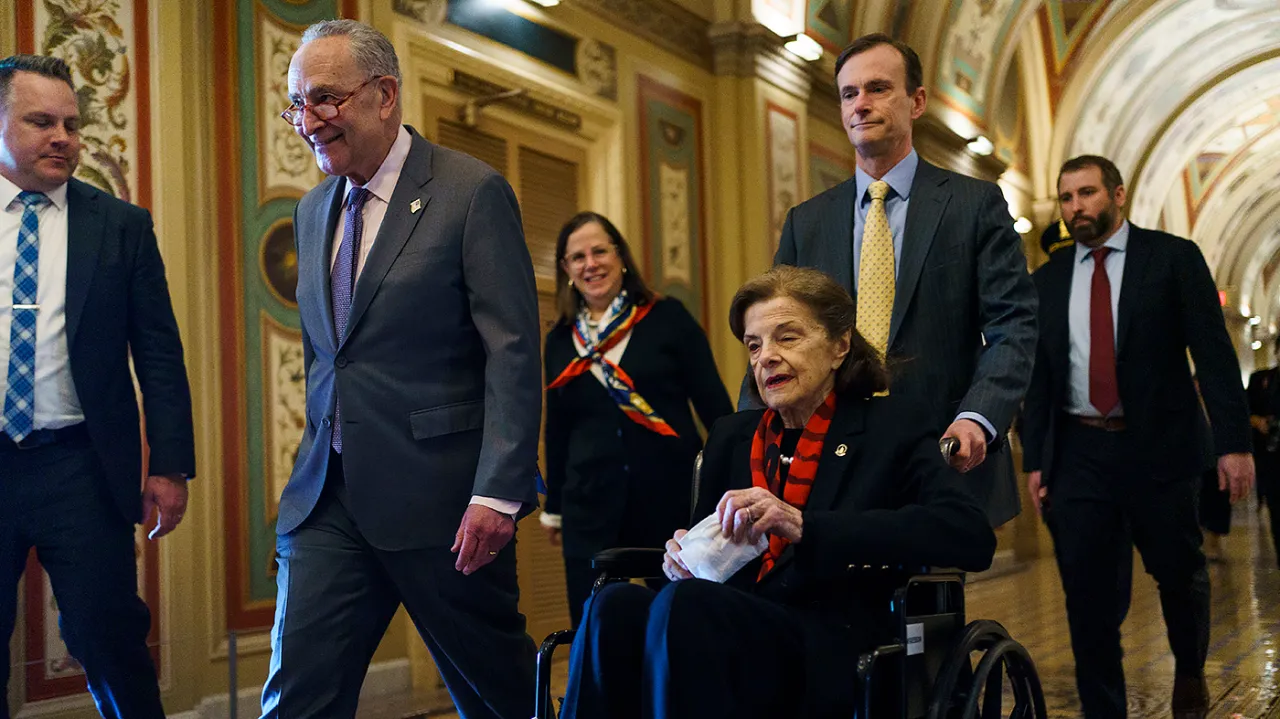The United States Senate has mourned the loss of one of its most prominent figures, as Senator Dianne Feinstein (D-Calif.) passed away at her residence in Washington, D.C. at the age of 90. Her death marks the conclusion of a lengthy and illustrious political career that played a crucial role in paving the way for women to attain higher echelons of political authority in the United States.
Senator Feinstein passed away on Thursday night, September 28, 2023 at the age of 90, shortly after casting her final vote, a moment that senators commemorated with heartfelt speeches. Emotions ran high as several senators, standing just a few feet from Feinstein’s Senate desk, which was draped in black and adorned with a crystal vase filled with white flowers, spoke about their esteemed colleague.
Senate Majority Leader Charles Schumer (D-N.Y.) paid tribute to her, saying, “She was smart, she was strong, she was brave, she was compassionate,” his voice occasionally quivering with emotion. He emphasized her “integrity” as the standout quality, describing it as a “diamond” that shone brightly not only in the Senate but also across the nation.
Throughout her career, Senator Feinstein shattered glass ceilings. She was the first woman to represent California in the Senate, the first woman to chair the Senate Judiciary, Rules, and Intelligence Committees, and the first woman to serve as mayor of San Francisco. She was part of the historic 1992 class of women elected to the Senate, often referred to as the “Year of the Woman,” alongside Senators Patty Murray (D-Wash.), Barbara Boxer (D-Calif.), and Carol Moseley-Braun (D-Ill.), which increased the number of women in the Senate from two to six. This number later surged to 25 by the start of the 118th Congress, with Feinstein cited as a significant influence.

Senator Tammy Baldwin (D-Wis.) praised Feinstein as a role model and highlighted her ability to foster bipartisan relationships, especially among female senators, both on and off Capitol Hill.
Feinstein also achieved the distinction of being the longest-serving woman in Senate history at the time of her passing, being likened to titanic figures of the Senate such as Senators Ted Kennedy (D-Mass.) and John McCain (R-Ariz.).
One of her most notable legislative accomplishments was the passage of the 1994 Federal Assault Weapons Ban, signed into law by then-President Bill Clinton. This legislation prohibited the sale and manufacture of assault-style weapons for a decade, despite fierce opposition from the National Rifle Association (NRA). Schumer recalled the NRA’s relentless opposition but praised Feinstein for her unwavering stance against them.
While the ban expired in 2004, a 2020 academic study suggested that the number of mass shootings increased after its lapse. However, the effectiveness of the assault weapons ban remains a subject of contentious debate, and subsequent attempts to pass similar legislation failed, even in the wake of high-profile shootings involving AR-15-style weapons.
Senator Feinstein also played a pivotal role in opposing the U.S. government’s use of torture during the global war on terror that followed the September 11, 2001, attacks. In 2014, she released the Intelligence Committee’s report, which documented the use of “enhanced interrogation techniques” against detainees, including waterboarding and sleep deprivation. This report raised doubts about the effectiveness of such tactics in gathering intelligence.
Senator Sheldon Whitehouse (D-R.I.) recounted the intense struggle to complete the report, as it faced opposition from the Central Intelligence Agency. Feinstein’s stand against torture techniques earned her praise, with Senator Elizabeth Warren (D-Mass.) commending her for her courage.
Feinstein wasn’t afraid to deviate from her party’s leaders on occasion. In 2009, she broke with party leaders who hesitated to seat Roland Burris (D-Ill.) as Senator Barack Obama’s replacement due to ethical concerns surrounding then-Illinois Governor Rod Blagojevich’s handling of the appointment. Feinstein argued that refusing to seat Burris would undermine gubernatorial power, a position that may have played a role in preserving California Governor Gavin Newsom’s authority to appoint her successor.
Throughout her career, Feinstein’s tenacity in pursuing policy goals and her ability to withstand political challenges earned her the nickname “Ali and Frazier” alongside Senator Barbara Boxer. Her personal touch and ability to foster camaraderie were also celebrated, with colleagues recalling warm interactions and gestures of kindness, such as ordering a purse for a fellow senator.
Senator Feinstein’s passing marks the end of an era in the Senate, leaving behind a legacy of trailblazing accomplishments and a commitment to integrity and principled leadership that will be remembered for generations to come.
